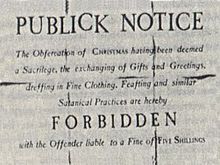
Now let us discuss the evolution of the Devil into the mid 17th century, when Christianity was the cornerstone of life in Europe. However, there were differing views on Christianity, as exemplified during the 1500s by the Protestant Reformation, caused by the ideas of Martin Luther and other reformers. A century later, the Puritans were a group of English Reformed Protestants that believed that the Church of England was only partially reformed, and that they had too many Catholic characteristics. They were a minority, and were constantly under religious persecution by the Church of England. As a result, they departed upon a voyage to the New World in search of religious freedom. Once they arrived, they sought to establish a theocracy with the "city upon a hill" ideology. The Puritans were extremely pious and devout Christians, and if you didn't follow their rules, you would be punished severely, to the point of even death or ostracization.
 |
| Publick Notice: The observation of Christmas having been deemed a Sacrilege, the exchanging of Gifts and Greetings, dressing in Fine Clothing, Feasting and similar Satanical Practices are hereby FORBIDDEN with the Offender liable to a Fine of Five Shillings |
Now, with some historical background, we can now discuss about the views of the Devil during this time period. As a result of their theocracy and strict rules, tensions began to build, and their society was on the edge of collapsing into anarchy. Unfortunately, this resulted in the Salem Witch Trials, in which 200 people were accused of practicing witchcraft and 20 were hanged, most of which did not have substantial evidence, with only "eyewitness" accounts. The Devil was viewed as sinister and malicious, taking victims' souls and possessing them. In Arthur Miller's The Crucible, "the Devil is out and preying on [Betty] like a beast upon the flesh of the pure lamb" (Miller 1047-1049). The Devil was viewed as a tangible being that directly affected people and could interfere with their daily lives, with mostly negative influences.
However, in today's society, the Devil is mostly viewed as an intangible being residing in Hell, rather than interfering with our lives. However, he is still viewed as causing sin, ranging from mass murdering to lying, in our lives. Overall, the view of the Devil has changed dramatically over time, from a malevolent being to a distant threat.
Now here's the interesting musical part: the Devil's interval, or tritone/augmented fourth/dimished fifth (the latter two depend on the notation, which is confusing if you don't know basic music theory, so don't worry about it). A major principal of music theory is intervals, which are the distance between two notes. For example, you may have heard of the most prevalent ones, such as major thirds, perfect fourths, and perfect fifths. The tritone is a distance of six half steps in between two notes, such as F and B. Played together would result in a tritone, creating discord. The dissonance sounded spooky, so if you played it back then, you could've been hung for associating your music with the Devil. However, the tritone is very important in establishing the mood and tone of a piece, whether rock or classical.
More info on tritones, augmented fourths, and dimished fifths: https://en.wikipedia.org/wiki/Tritone
However, in today's society, the Devil is mostly viewed as an intangible being residing in Hell, rather than interfering with our lives. However, he is still viewed as causing sin, ranging from mass murdering to lying, in our lives. Overall, the view of the Devil has changed dramatically over time, from a malevolent being to a distant threat.
Now here's the interesting musical part: the Devil's interval, or tritone/augmented fourth/dimished fifth (the latter two depend on the notation, which is confusing if you don't know basic music theory, so don't worry about it). A major principal of music theory is intervals, which are the distance between two notes. For example, you may have heard of the most prevalent ones, such as major thirds, perfect fourths, and perfect fifths. The tritone is a distance of six half steps in between two notes, such as F and B. Played together would result in a tritone, creating discord. The dissonance sounded spooky, so if you played it back then, you could've been hung for associating your music with the Devil. However, the tritone is very important in establishing the mood and tone of a piece, whether rock or classical.
 |
| On the left, you see a tritone between F and B, as stated earlier. On the center and the right, you can see the difference between augmented fourths and dimished fifths. |
More info on tritones, augmented fourths, and dimished fifths: https://en.wikipedia.org/wiki/Tritone
